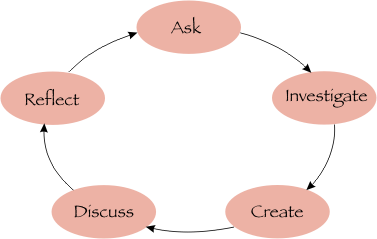The topic: The Livestock Dating Game
This was an inquiry-based lesson demonstrated by three Ag teachers from across the United States, and it taught me what Inquiry-based lessons and learning really was.
Let me tell you how it went...
The instructors asked for three male volunteers and one female volunteer to head to the front of the room. The interest approach was basically a bachelorette heifer looking for her soulmate in one of the three bulls. Each of the bulls read their descriptions and the entire class had the chance to vote for their pick of the herd.
Once that was completed, the presenters handed out some geography books and some laminated cards. We proceeded on with our activity by basically choosing which two breeds of cattle to cross that would fit the needs of a country in which each of our pairs were assigned.
We researched our country and choose a cross between a Florida Cracker and a Brahman, and the presenters went around the room to pass out results cards. These cards were random, so the results varied among each of the pairs. When that was completed, we discussed our results and were able to develop further questions from the activity.
So, what is Inquiry-based learning?
 It is basically a learning process where the students are in control. The manage what they investigate, what questions to form, etc. The teacher ends up playing the role as the facilitator as they spend less time in lecture form and more time in the actually learning activity,
It is basically a learning process where the students are in control. The manage what they investigate, what questions to form, etc. The teacher ends up playing the role as the facilitator as they spend less time in lecture form and more time in the actually learning activity,According to our reading, Inquiry-based learning is very beneficial for students and helps improve student success. It is obvious to see as they are actually applying their knowledge and digging deeper into the content.
In an additional article that I found (click here for article), it explains that there are definitely benefits for Inquiry-based learning. It helps in improving their science, research, and literacy skills, but there was not a significant difference between Inquiry-based and traditional curricula.
What are my Thoughts?
I really enjoyed that Inquiry-based workshop at the National FFA Convention, so I highly recommend using this tool in the classroom. Students have the ability to apply the knowledge learned from the activities to outside of the classroom, and they feel in control of their activity. Teachers can definitely take this and mold it into any shape they want and run with it!
No comments:
Post a Comment